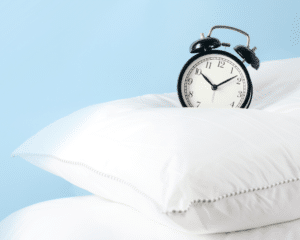By Jake Johnson
Sleep can change in key ways as we age, and while these changes are normal, this transition can be confusing and frustrating for some older adults.
However, there is good news, said UPenn Associate Professor of Medicine Nalaka Gooneratne, MD, MSc: By making a few adjustments to how you approach sleep, you can reduce these frustrations and continue to get good quality sleep.
1. Older adults need less sleep, so adjust your sleep schedule accordingly
The biggest change in sleep you may experience as you get older is that you need less of it.
“Typically, older adults need about half an hour to an hour less sleep than they needed when they were middle-aged adults,” Dr. Gooneratne said. “And many older adults who feel like they’re sleeping worse—sometimes it’s because they’re trying to get as much sleep as they had when they were younger, but their body just doesn’t need it anymore.”
Seven hours of sleep is typical for older adults. The best way to adjust for a shorter sleep schedule, Dr. Gooneratne said, is to first choose a time you want to wake up and then count backwards by seven. So, if you want to wake up at 7 a.m., you will probably have to go to bed around 12 a.m. or you will run the risk of lying in bed awake for a few hours.
But if staying up feels too difficult, you can try waking up earlier. For example, a 10 p.m. bedtime would mean waking up around 5 a.m.
2. Stick to a sleep schedule as much as possible
Once you’ve chosen when you want to get up, try and stick to that schedule as much as possible, Dr. Gooneratne said. Keeping a regular schedule will let your body know when you want to get up and help you fall asleep at night.
“If they want to sleep in, it’s okay to sleep in one night a week, but they really shouldn’t sleep in more than that,” he said. “That’s a particular challenge for many older adults because many of them are retired.”
3. You may wake up in the middle of the night more—do something unstimulating to pass the time
Another normal sleep development as we get older is that we tend to wake up in the middle of the night more often. It’s normal to be awake for up to an hour in the middle of the night as an older adult.
While this can feel frustrating, Dr. Gooneratne said the best thing you can do is try not to fight it and find an activity that is calming and relatively dry.
Usually, things on your smartphone or TV are too engaging to easily fall back asleep, so try reading or writing instead. If you’re a religious person, this could be a good time to say prayers, he said.
4. Look out for sleep conditions, and talk to your doctor
Older adults are also more at risk for sleep conditions, which can disrupt sleep, he said. The most common of these sleep conditions is sleep apnea, which is characterized by snoring and gasping during sleep.
He said to look out for any signs of snoring, gasping, or choking in you or your partner and tell your doctor, as sleep apnea can greatly interfere with your sleep quality.
Talk to you doctor as well about how medications you’re taking interact with sleep, as these could also disrupt your sleep.
More sleep tips
Exercise can help
If you’re struggling with insomnia, exercise is a great way to make sure you feel tired at the end of the day, Dr. Gooneratne said.
For people over 65, the CDC recommends 150 minutes of exercise a week that is moderate-intensity, like brisk walking, or 75 minutes of vigorous-intensity such as hiking or jogging.
Use technology to manage and track sleep
Dr. Gooneratne also recommended a few devices to help you keep track of your sleep.
If you’re going on a trip, Jet Lag Rooster by Sleepopolis can help you come up with a plan to help reduce the effects of jetlag. Type in where you’re flying from and flying to, when you’re departing and arriving, and when you normally go to bed and wake up, and the website calculates a plan to transition you to a new time zone.
Fitbits are another device that will track your sleep; however, Dr. Gooneratne said to ignore REM sleep tracker and sleep score because they are often inaccurate. Pay attention to the amount of time it says you slept because this is fairly accurate and can give you a sense of how much you’re waking up in the night.
Overall, while it might be hard, the best thing you can do is not overly fixate on how much sleep you’re getting. If devices bring you more anxiety around sleep, then it’s best to ditch them completely.
